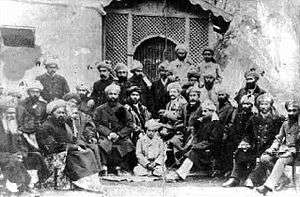Malalai of Maiwand
Malalai of Maiwand Pashto pronunciation: [malɑˈləi] (Pashto: د ميوند ملالۍ), also known as Malala (Pashto: ملاله), or Malalai Anna (Pashto: ملالۍ انا, meaning Malalai the "Grandmother") is a national folk hero of Afghanistan who rallied local fighters against the British troops at the 1880 Battle of Maiwand.[1] She fought alongside Ayub Khan and was responsible for the Afghan victory[2] at the Battle of Maiwand on 27 July 1880, during the Second Anglo-Afghan War. She is also known as "The Afghan Jeanne d'Arc"[3] and as "The Afghan Molly Pitcher"[4] to the Western world. There are many schools, hospitals, and other institutions named after her in Afghanistan. Her story is told in the Afghan school text books. The Pakistani-Pashtun women's-rights activist Malala Yousafzai and Afghan activist-politician Malalai Joya are both named after Malalai of Maiwand.[5]
Malalai of Maiwand | |
|---|---|
| Born | 1861 Khig, Kandahar, Afghanistan |
| Died | July 27, 1880 (aged 18–19) Maiwand, Kandahar, Afghanistan |
| Nationality | Afghan |
| Other names | Malala, Anna, Malalai Anna |
| Known for | Battle of Maiwand |
Biography
Malalai was born in 1861 in the village of Khig, about 3 miles southwest of Maiwand in the southern Kandahar province of Afghanistan.[6] During the late 1880s, for the second time, Afghanistan was occupied by British-Indian forces attempting to colonise the area and annex it with what was then British India (now Pakistan and India). The main garrison of the British was located in Kandahar, which is the closest city to the town of Maiwand. The military of Afghanistan was represented by commander Ayub Khan, son of Afghan Emir Sher Ali Khan. Malalai's father, who was a shepherd, and her fiancé joined with Ayub Khan's army in the large attack on the British-Indian forces in July 1880. Like many Afghan women, Malalai was there to help tend to the wounded or provide water and spare weapons. According to local sources, this was also supposed to be her wedding day.

When the Afghan army was losing morale, despite their superior numbers, Malalai took the Afghan flag and shouted:
Young love! If you do not fall in the battle of Maiwand,
By God, someone is saving you as a symbol of shame![7]
This inspired the Afghan fighters to redouble their efforts. When a lead flag-bearer was killed, Malalai went forward and held up the flag[8][9] (some versions say she used her veil as a flag[10]), singing a landai (a short folk-song sung by Afghan women):
With a drop of my sweetheart's blood,
Shed in defense of the Motherland,
Will I put a beauty spot on my forehead,
Such as would put to shame the rose in the garden![7]
Malalai was herself struck down and killed by a British soldier.[11] However, her words had spurred on her countrymen to victory. After the battle, Malalai was honored for her efforts and buried in her native village of Khig, where her grave remains today. She was 18 or 19 at the time of her death.[10] She is buried in the village of Karez along with her father and fiancé, locals regard her grave as a shrine.[12]
The Pashtun poet Ajmal Khattak wrote the following lines about Malalai:
My Malalai is living, and they praise others' beauty.
Though they have eyes, they are blind.
Legacy
Malalai made an appearance in an animated opening scene of the documentary, He Named Me Malala.
See also
- Nazo Tokhi, a 17th-century Afghan warrior
References
- Johnson, Chris; Jolyon Leslie (2004). Afghanistan: the mirage of peace. Zed Books. p. 171. ISBN 1-84277-377-1. Retrieved 2010-08-22.
Malalai Maiwand.
- Abdullah Qazi. "Afghan Women's History". Afghanistan Online. Retrieved 2010-09-12.
- "Ehrungen". Katachel.de. Archived from the original on 2011-09-12. Retrieved 2011-06-25.
- Garen Ewing. "Maiwand Day: Wargaming the Afghan War". garenewing.co.uk. Retrieved 2013-06-08.
- Malala Yousafzai; Christina Lamb (8 October 2013). I am Malala: The Story of the Girl Who Stood Up for Education and was Shot by the Taliban. Orion. ISBN 978-0-297-87093-7.
- Wahid Momand. "Malalai of Maiwand". Afghanland.com. Retrieved 2010-09-12.
- Garen Ewing (2005). "Afghan heroine Malalai". Retrieved 2010-09-12.
- Najmuddin, Shahzad Z. (2006). Armenia: a Resume: With Notes on Seth's Armenians in India. Trafford Publishing. p. 103. ISBN 1-4120-7916-0. Retrieved 2010-08-22.
- Siba Shakib. "Battle of Maiwand" (PDF). tricycle.co.uk. Retrieved 2011-06-09.
- Okkenhaug, Inger Marie; Ingvild Flaskerud (2005). Gender, religion and change in the Middle East: two hundred years of history. Berg Publishers. p. 191. ISBN 1-84520-199-X. Retrieved 2010-08-22.
- Afghanistan Declassified: A Guide to America's Longest War By Brian Glyn Williams p 109
- Wagner, Erich. 2012. "The Bones of the British Lying in Maiwand are Lonely." Marine Corps University Journal. Volume 3 (1) Spring 2012. Page 46.